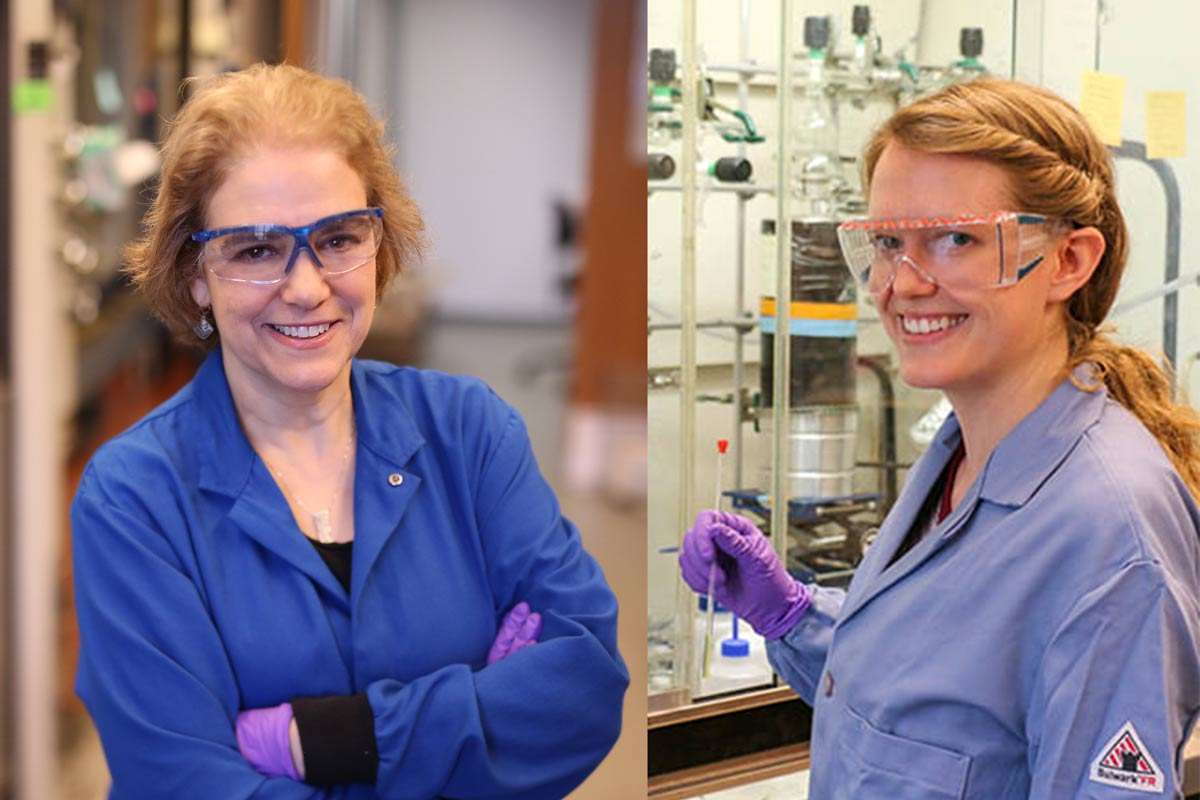Oil, Oil Everywhere
Researchers in the Goldberg group, including Karen Goldberg, Vagelos Professor in Energy Research, and Drew Newman, doctoral candidate in chemistry, focus on alternative fuel sources for items that are part of everyday life.
Karen Goldberg was drawn to chemistry because she thought it was beautiful. “There are these things called orbitals, where the electrons in atoms and molecules reside,” she remembers. “They have particular shapes and I thought they were very cool, just beautiful. My students think it’s funny I can pinpoint my inspiration that specifically.”
Phenomena like orbitals got her interested, but it was a college professor who motivated her to pursue chemistry as a career. “He gave us problems from published research that were essentially puzzles—we had to use the data that the authors reported as clues, and the professor would explain when our ideas were right or how we went wrong in our reasoning,” she says. “And I thought it was just so much fun to try and figure out the puzzle.”
Goldberg, Vagelos Professor in Energy Research and Director of the Vagelos Institute of Energy Science and Technology, is now working to solve puzzles related to alternative fuel sources. Her research group focuses on new systems to produce chemicals and fuels from a range of readily available feedstocks. Traditionally, byproducts obtained during the process of petroleum refining are used as chemical feedstocks to make everything from shampoo to medicine to clothing.
She explains, “Normally, people think of oil and their immediate thought is gasoline. But an important byproduct of petroleum refining are other fractions of carbon chain lengths that aren't suitable for fuels, and that provides the petrochemical industry with their chemical feedstocks.”
Drew Newman is a doctoral candidate in chemistry and member of the Goldberg group, which seeks to develop new catalytic systems to utilize readily available chemical feedstocks more efficiently. Newman’s work focuses on converting methane to methanol. Methane is the main component in natural gas, but a considerable amount of methane goes to waste because as a gas, it is difficult and expensive to transport. In contrast, methanol is a liquid which can be transported and converted to higher-value chemicals.
Newman explains that oil companies often hit natural gas or methane deposits when drilling. If the site is far from a facility that can handle and process the methane, it is most often flared—burned off.
“This is a wasteful process because methane has value as a feedstock, and flaring is also a harmful process for the environment because you're releasing a lot of CO2 gas,” she says. “So, my research is based on the idea that if you could capture methane and turn it into something that's easier to transport, you could circumvent that whole problem.”
She continues, “We do a lot of wet bench chemistry, so we're in the lab mixing things together, running a lot of reactions. The pandemic threw a bit of a wrench in things. We were able to do a lot of literature reading and turn to computational chemistry, but in general, we lost research time.”
The Goldberg group has been back in the lab at reduced capacity since June 2020, with researchers running reactions on campus and analyzing data at home. Because their lab space is large enough to allow for social distancing, the lab was recently able to resume pre-COVID capacity.
Goldberg says that the problem of wasted feedstocks is prevalent, even if largely invisible to many people.
“We'll do outreach exhibits where we'll put a whole bunch of things on a table—tape, contact lenses, laundry detergent, an umbrella, aspirin, lipstick—and say, ‘Which of these comes from oil?’ she says. “And people are horrified to find out, it’s all of these things. “
While people may worry about oil production and consumption, she cautions they should not fear chemicals. “Chemicals aren't bad. Water is a chemical. The field is very interested in alternative carbon sources for chemicals and fuels because the goal is to move away from a petroleum society.”
Newman adds that members of the group are motivated to “study fundamental reactions, which have the potential to influence industrial reactions, which are done on a much larger scale. I think that's really exciting for everyone.”
While this fundamental research could lead to greener technologies, Goldberg says that policy must work with science to create a greener future. Newman’s work on methane provides an example.
“A carbon tax would immediately change the picture on flaring gas,” says Goldberg. “Now, companies flare gas because it's too expensive to transport it. But if you put a monetary value on methane emissions, then the equation changes, and companies are more motivated to find a way to transport or convert that gas.”
As research continues, Goldberg points out the collaborations between faculty and students. Her group is currently working with groups led by Marissa Kozlowski, Professor of Chemistry, and Karen Winey, Daeyeon Lee, Ray Gorte, and John Vohs of Penn Engineering. These collaborative pursuits have Goldberg excited about the plans for the new Vagelos Laboratory for Energy Science and Technology.
“It’s really going to be spectacular,” she says. “It’s free-flowing and labs will be adjacent to each other. There will be spaces in the building to sit and talk and come up with new ideas.” And, in the spirit of reducing greenhouse gas emissions, she adds, “It’s going to be beautiful—a lot of care has gone into making sure it’s very energy-efficient.”



